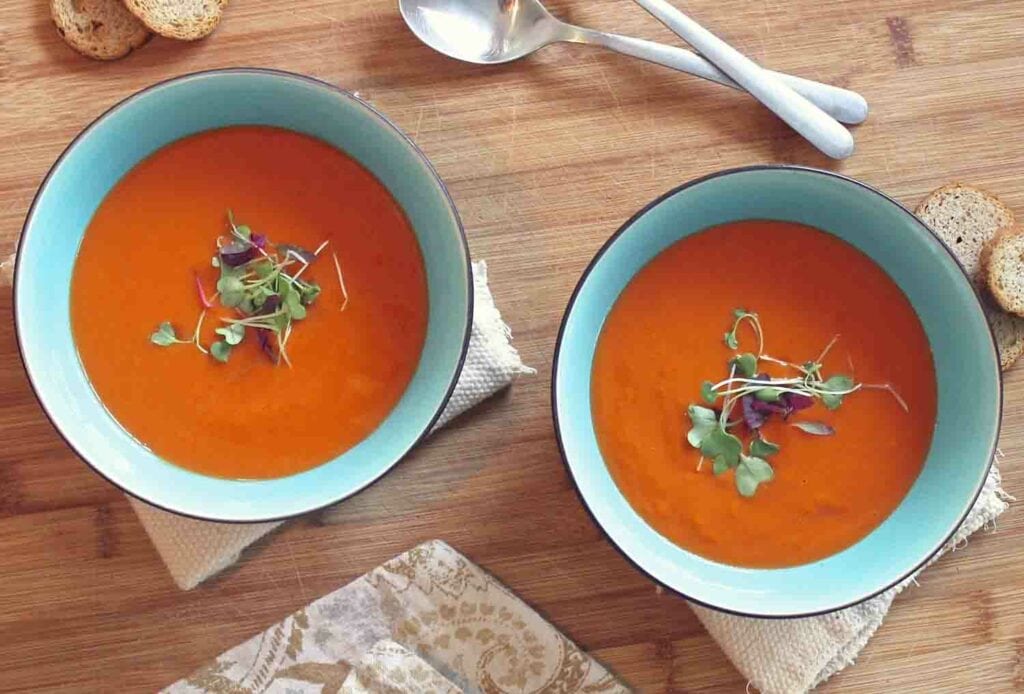
Personal update #2: Lots of developments and a new SIBO diet
At the end of April, I shared my personal update on the SIBO diet I follow. We are now almost 2 months in, so I wanted to update you on how things are going now.
After the first phase of the diet, I noticed an improvement in my complaints.
The bloated feeling I used to suffer from after every meal had improved greatly.
Although not all my complaints were improving yet. Unfortunately, things have gone less well in recent times and the improvement didn’t continue.
I was allowed to add some dairy to my diet again in the second phase of the diet: homemade yogurt and cheeses that had been aged for more than 4 weeks.
I’m not sure if it was really the yogurt and cheese, but during that period my complaints got worse again.
I started to suffer more from a bloated feeling after every meal, flatulence, and my stools got worse.
That was a bit of a setback and I also noticed that it affected my motivation to keep up this strict diet.
Because why eat so limited if I have the same complaints that I had when I ate a normal low FODMAP diet?

Back to a stricter diet
In consultation with my dietician, we decided that I would leave dairy out of my diet for a while to see how this went.
I also started replacing olive oil with coconut oil, among other things, because that also seemed to bother me.
This made my complaints slightly better, but there was still not much improvement.
At the next appointment, we discussed what the best next step was. My dietician also found it difficult to determine what exactly was the reason that my complaints did not get better. And had expected to see improvement sooner
We discussed starting with an elementary diet. A diet in which you only eat medical food for 2 weeks in order to kill off the bacteria in the intestines that cause complaints.
This is very intense because you are not allowed to eat anything other than powdered food for 2 weeks. And this medical food is apparently very disgusting and is also very expensive.
We also discussed the use of antibiotics as a possible option. But it was not immediately easy to say which type of antibiotics would work for me and whether they would have an effect on all my complaints.

Starting another diet?
Coincidentally, during this period I came into contact via my blog with Jacqueline Gerrits, orthomolecular dietician and author of a Dutch book about FODMAP and IBS and a book about SIBO.
I bought the book she wrote together with Joyce Bijl to learn more about what SIBO exactly is and what causes SIBO.
There were few Dutch sources of information about SIBO and this book provided a lot of useful information.
Jacqueline has a lot of experience with IBS and SIBO-related complaints and I decided to ask her if she wanted to take a look at my case.
The elementary diet felt like an extreme step and I was also a bit hesitant about antibiotics because I know that’s not very good for your body.
Jacqueline gave me a metabolic screening list to fill out. A list with a lot of different types of complaints of which I had to indicate to what extent I have them.
She also went through the results of my stool test. Based on that, she put together a treatment plan for me.
What I really liked is that in our first conversation, she gave a very detailed explanation of exactly how my body works and where the complaints I currently have come from.
What exactly happens in the body from the moment you take a bite of food to the moment it comes out on the other side?
Why is my body reacting the way it is reacting now? And what can we do about it? This gave me a lot of background information about the important processes in my body that I didn’t know yet.
And most importantly: it gave me a very clear motivation to work on this.
On the strict SIBO diet, I noticed that I sometimes became a bit recalcitrant. With thoughts like I can’t eat anything anymore, I just have to eat those boring meals, everyone eats all kinds of tasty things and I don’t. This is not fair.
Now I understood much better: I have to eat specific products more often because they give my body the nutrients it needs.
This is necessary to start repairing my tissues that are now deficient in nutrients.
With every bite I take, I help myself and my body to get a little better every time. That felt like a very important mindset shift and I immediately noticed that I was a lot more positive about it.
I have therefore decided to switch dietitians and continue this process with Jacqueline Gerrits.

Eating more different foods
Based on my complaints and the deficiencies I currently have in my body, my dietician has put together a diet plan for me.
This diet plan has similarities with the strict SIBO diet plan I followed before, but I can eat and try a lot more different things.
Jacqueline has looked at which nutrition will help me the most to strengthen my body at the moment and I will focus on that in the coming weeks.
Certain things I have to avoid for a while and others I have to try to eat a little extra.
My list also contains some things that are not low FODMAP, because these are products that contain very valuable building materials for my body cells.
Those building materials provide more for my body than they cause complaints in my body.
From these products, we discussed that I stay away from the things that I now know I react very strongly to.
Honey, for example, is a product that I’m really afraid of because I reacted so violently to it. So I won’t touch that for now.
But I’m just going to try small amounts of other products, to see if my intestines can digest and absorb them a bit more now.
For example, yesterday I ate a quarter of a plum, which I had warmed up beforehand. Quite exciting, because I think I hadn’t had plums in almost 10 years.
But nothing bothered me. This immediately gave me a little confidence that my body might be able to handle more than I think.

Tips and advice
In addition, I have received various tips and advice that should also help with my complaints.
For example, avoid raw vegetables as much as possible, because your body can digest raw vegetables less effectively in this phase than cooked vegetables.
The vegetables have already been largely disinfected by heating them. This is a good help for your body if you can’t yet make enough stomach acid to do this job properly.
In addition, heating ensures that most cell walls and membranes of the vegetables are already broken, so that your intestine, if it is not yet at full strength, can quickly access the valuable content of the cells.
The absorption of valuable nutrients is thus faster and easier.
I already knew that salads, for example, affected me more than cooked vegetables, but it was a good confirmation to hear this again.
In addition, eating smaller meals was an important tip. And should I try not to eat anything in the periods between my meals, about 2 hours.
I feel that this second tip is already having an effect, even though I’ve only been doing this for a few days.
I have a huge sweet tooth and I love to eat. When I’m at home, I sometimes put something in my mouth every hour. Often without thinking. I give my body very little rest in between to process what I ate.
So it sounds very logical that it can help to give my body that rest. And I really feel like this is already doing something.
I am therefore very curious how this will develop in the coming weeks.

A complex puzzle
As you can read, my trajectory has been quite a puzzle in recent weeks. And I have tried and considered different things. I think this is also how you can see a PDS or SIBO trajectory.
The solution is not the same for everyone and it is quite a bit of searching for what works and what doesn’t work for you. But if something doesn’t work, the most important thing is not to give up and try something else.
I’ve had quite a few moments in the last few weeks where I was on the verge of throwing in the towel.
But I now have new energy to continue and I am enthusiastic about the developments of the past few days.
I want to get rid of those intestinal complaints, so giving up is really not an option.
I’m far from there yet, but I’ll continue to share my journey and progress with you. Hopefully, the things I learn can be valuable to you as well.
What do you think about my trajectory of the past period?
And if you also have experience with SIBO, what are your experiences? How are your complaints now?
Feel free to let me know in the comments below or send an email to karlijn@karlijnskitchen.com.
Together we go for a calm belly!
Subscribe to the Karlijn's Kitchen e-mail newsletter for more tips and recipes and receive the ebook 10 things I wish I had known when I started the FODMAP diet for free!

3 Comments
Hey Karlijn! I’ve been suffering from IBS symptoms since moving from abroad to Flanders and all the gut microbiome changes that came with that. 🥲 I’ve been following your blog for a while and send you all the love and support on your journey; your recipes are awesome!
I’m not seeing a dietician but I’m studying physiology, and what happened one day is in a lecture one of my professors mentioned all the great effects of regular eating on the body (like regular sleeping—our bodies really really like rhythms and predictability). When we do unpredictable things (snacking), we really irritate the digestive ststem and don’t give our gut enough time to clean up from the last meal.
I noticed that, like you, I had been snacking quite often, so I decided to try intermittent fasting. I have much larger meals than you mentioned (with dessert included right after) but I give my body at least 4 hours between meals and a fast of 16 hours overnight. It has helped me tremendously, the good stuff I hadn’t been able to eat before I’m now able to eat with little or no symptoms at all (apples and garlic!!! can you imagine?).
Don’t know if this is helpful because not everyone’s lifestyle or routine can fit a fast, and not everyone’s gut can handle it when already nutrient deprived, but I can tell you from my end that I’ve really enjoyed the benefits.
I hope you have a lovely day and keep us updated on how it goes for you!
Hi Dania, thank you for your support! I hear more often that intermittent fasting has good results for some people. Great it helps for you. And that you can eat things like apples and garlic again, that’s wonderful!
My body cannot handle large meals right now I feel, it really causes me symptoms. But I do try to eat less often and also in the evening I try to stop eating earlier, so I have a longer fasting window in the night. I’ll keep you updated on how things go 🙂
Hi Karljin, I’m a nutritionist and also have sibo. I have read about your struggles with diet, but have any of these practitioners prescribed an anti-microbial to kill off the sibo? It can’t be done with diet alone, you likely need an antimicrobial/antibiotic and/or a biofilm disruptor. Also highly suggest the breath test so you know what type of sibo you have which will help treatment. Phoebe Lapine (feed me phoebe) has a great book on sibo with some healthy and tasty recipes. Best of luck in your healing journey.😊